[Big read] If Taiwan wants US help, it has to prove it’s willing to fight
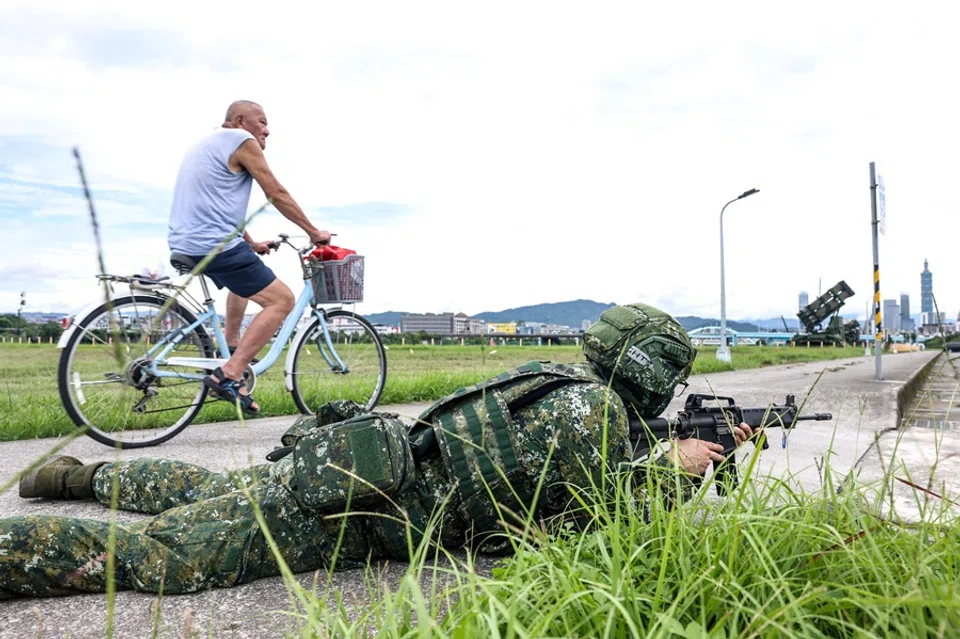
Recent surveys have shown an increased willingness of Taiwanese conscripts to fight in the event of a mainland Chinese invasion, while the average willingness among the Taiwanese public has stayed consistent around 70%. However, is this enough to guarantee US support in the event of war? Lianhe Zaobao journalist Miao Zong-Han speaks with Taiwanese young men and academics to find out more.
Taiwan’s annual Han Kuang military exercise officially began on 9 July. This is the first large-scale live-fire drill since Taiwan President Lai Ching-te labelled mainland China as a “foreign hostile force”. The exercise has set new records in duration and troop mobilisation; the scope and intensity are also far greater than in previous years.
Whole-of-society defence resilience
This exercise not only formally targets non-traditional “grey zone” tactics, but also, for the first time, integrates civilian defence drills and logistical components. It includes “defence in depth” strategies and protracted warfare as part of urban resilience drills, with chain supermarkets participating in simulated air raid evacuation drills. Taiwanese authorities stated ahead of the exercise that its purpose is to strengthen whole-of-society defence resilience, encourage public participation in realistic, everyday scenarios, and raise awareness of self-defence.
Analysts generally believe that the move reflects Taiwan’s heightened alert to the risk of Beijing escalating drills into real attacks, while also signalling stronger self-defence determination to the international community by enhancing its combat readiness.
... the willingness of surveyed conscripts to fight in the event of a mainland Chinese invasion increased by an average of 7 to 15 percentage points.
Conscripts’ willingness to fight
Last year, Taiwan’s Ministry of National Defense and Academia Sinica conducted a year-long survey on the will to resist the enemy among male conscripts aged 18 to 22. This was the first large-scale study of its kind since last year when Taiwan extended mandatory military service to one year.
Preliminary results released in June show that after eight weeks of basic training, the willingness of surveyed conscripts to fight in the event of a mainland Chinese invasion increased by an average of 7 to 15 percentage points.
Millennial Kuo Jui-chen (pseudonym) completed four months of military service in April. Majoring in law in university, he has closely followed Taiwan politics and changes in the cross-strait geopolitical situation during his student years.
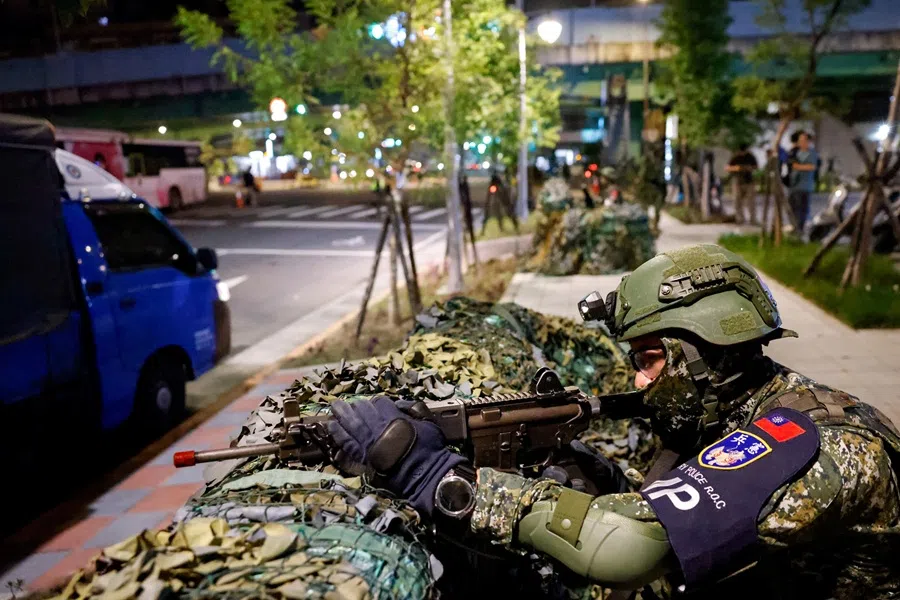
He told Lianhe Zaobao that even before his military service, he understood clearly that “if war broke out, there would be nowhere to run anyway, so I am already willing to fight”. After military training, he feels even more willing to take up arms if that day comes.
“Everyone’s mindset becomes more practical [after military service]. It’s less about whether we want to fight and more about what to do when we’re on the battlefield,” said Kuo.
“If it’s the Democratic Progressive Party (DPP) declaring Taiwan independence or provoking the mainland, I absolutely wouldn’t go to the battlefield.” — Chang Che-wei (pseudonym), a Taiwanese who has completed four months of military service
Chang Che-wei (pseudonym), who also completed four months of military service and was discharged at the end of last year, now works in the finance sector. He said that he is willing to fight if war breaks out — but only if mainland China initiates the attack. “If it’s the Democratic Progressive Party (DPP) declaring Taiwan independence or provoking the mainland, I absolutely wouldn’t go to the battlefield,” he said.
Huang Ching-hsiang (pseudonym), 28, is a reservist who has undergone two rounds of recall training. He works as a programmer at the Hsinchu Science Park and has a three-year-old son and a two-year-old daughter with his wife. He stressed that he would never go to war. “My wife and children are more important to me than Taiwan,” he shared. Hence, he is now considering leveraging his experience in the high-tech industry to emigrate overseas.
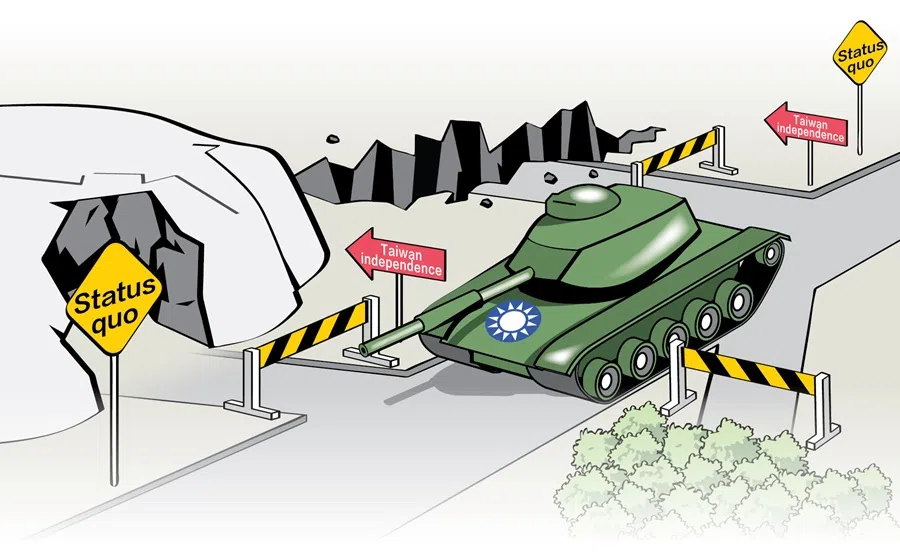
Amid growing tensions in the Taiwan Strait, the extent of Taiwan’s determination to defend itself has continued to draw global attention and sparked heated debate within the island in recent years.
Willingness by political affiliation
Taiwanese writer Lung Ying-tai, who served as culture minister under the Ma Ying-jeou administration, argued in an April op-ed for The New York Times that Taiwan should try to reconcile with mainland China. Citing an informal poll from the anonymous student forum Dcard, she noted that influenced by the war in Ukraine, over 70% of Taiwanese students said they would choose to surrender. Lung thus inferred that in the event of a mainland invasion, most Taiwanese would favour surrender over resistance.
Meanwhile, Wu Wen-chin, a research fellow at the Institute of Political Science at Academia Sinica, and Pan Hsin-hsin, an associate professor at the Department of Sociology at Soochow University — both long-time observers of public opinion on Taiwan’s security — published a rebuttal to Lung’s views in The Diplomat.
They pointed out that both the World Values Survey and long-term studies by Academia Sinica’s Institute of Sociology consistently show that since 1998, around 70-80% of Taiwanese people were willing to fight for Taiwan in the event of war.
Additionally, a March survey by the Institute for National Defense and Security Research, a defence ministry-backed think-tank, found that 66% of the public would be willing to fight to defend Taiwan if Beijing launched an invasion.
85% of DPP supporters were willing to fight to defend Taiwan, the highest among the three major parties, followed by 54% of Taiwan People’s Party supporters and 48% of Kuomintang supporters.
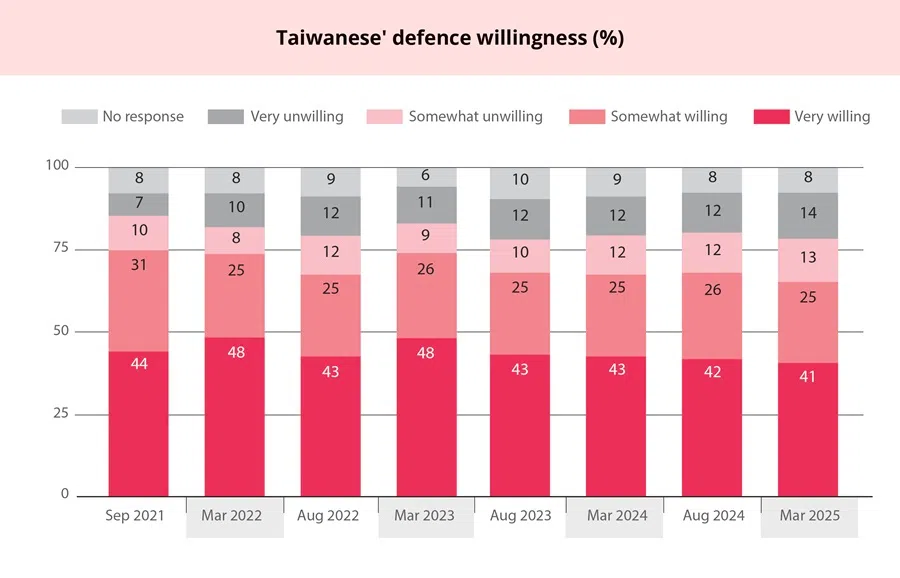
However, the survey also revealed a noticeable discrepancy in the willingness to resist among the supporters of different political parties in Taiwan. Among them, 85% of DPP supporters were willing to fight to defend Taiwan, the highest among the three major parties, followed by 54% of Taiwan People’s Party supporters and 48% of Kuomintang supporters.
Therefore, considering the survey results collectively, the average willingness to resist among the Taiwanese public is approximately 70%. This outcome also resonated with trends in national identity and the stance on unification among the Taiwanese public.
Maintaining the status quo
Since 1992, the Election Study Center at Taiwan’s National Chengchi University has conducted long-term opinion polls on national identity and unification in Taiwan. Ever since the proportion of people who identified as “Taiwanese” (台湾人) surpassed those who identified as “both Taiwanese and Chinese” (是台湾人也是中国人) in 2008, it has consistently ranked the highest. The latest results released on 7 July showed that 62% of Taiwanese identified as “Taiwanese”.
In terms of unification or independence, since the outbreak of the Russia-Ukraine war in 2022, “maintain status quo indefinitely” became the most favoured option in this survey. The latest survey showed that 34.6% of Taiwanese choose to maintain the status quo indefinitely, while 26.5% choose to maintain the status quo and decide at a later date. When combined, this indicated that 61.1% of Taiwanese favoured “maintaining the status quo” when it came to unification or independence, a clear depiction of mainstream opinion.
Taiwanese public does not want to provoke war
Christina Chen, an assistant research fellow at Taiwan’s Institute for National Defense and Security Research, interprets the Taiwan National Defense Survey’s mainstream opinion of “maintaining the status quo” as reflecting a desire to avoid war. This aligns with government policy to “not provoke confrontation” and the public’s general expectation for peace and stability.
Most Taiwanese are acutely aware of their reality, making “maintaining the status quo” a “very pragmatic and risk-averse” strategy. — Christina Chen, Assistant Research Fellow, Institute for National Defense and Security Research
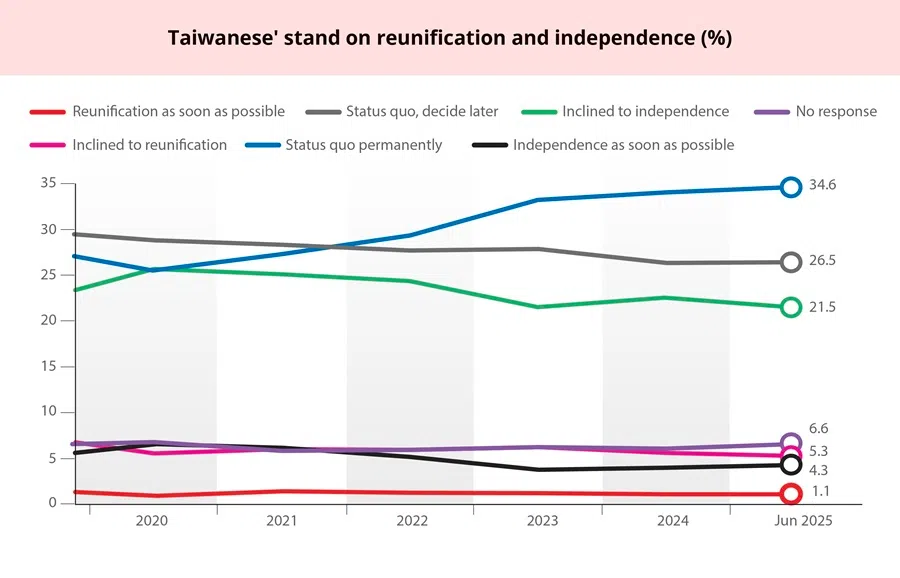
Chen explained that, facing powerful external threats and a disadvantaged international position, most Taiwanese are acutely aware of their reality, making “maintaining the status quo” a “very pragmatic and risk-averse” strategy. She also suggested that some might adopt a conservative stance in surveys, fearing their true views could be interpreted as provocative.
However, Chen emphasised that from the survey results on the willingness to defend, most Taiwanese still believe that if conflict were to break out in the Taiwan Strait, “There would certainly be no choice but to defend our homeland; but until that happens, we seek peace.”
However, results from the Taiwan National Defense Survey also showed that 65% of respondents believe that the likelihood of the People’s Liberation Army attacking Taiwan within the next five years is low. Chen cautioned that the Taiwanese public might become desensitised to frequent military actions from the mainland. While Taiwanese society is aware of Beijing’s threats, there remains a need for increased vigilance, especially concerning pervasive and hard-to-detect non-traditional security threats.
Can Taiwan fight alone — even for a while?
The Han Kuang exercise in Taiwan this year, which lasted ten days, not only marked the longest duration in history, it also mobilised 22,000 reserve soldiers, the largest number to date, with the new recall training starting on 5 July for 14 days. According to Taiwanese media reports, the American Institute in Taiwan (AIT) also sent military attachés and liaison officers to observe the new training on 8 July.
Taiwan would need to withstand enemy attacks independently for a significant period before the US military could affect the conflict’s outcome. — Chieh Chung, Researcher, Association of Strategic Foresight
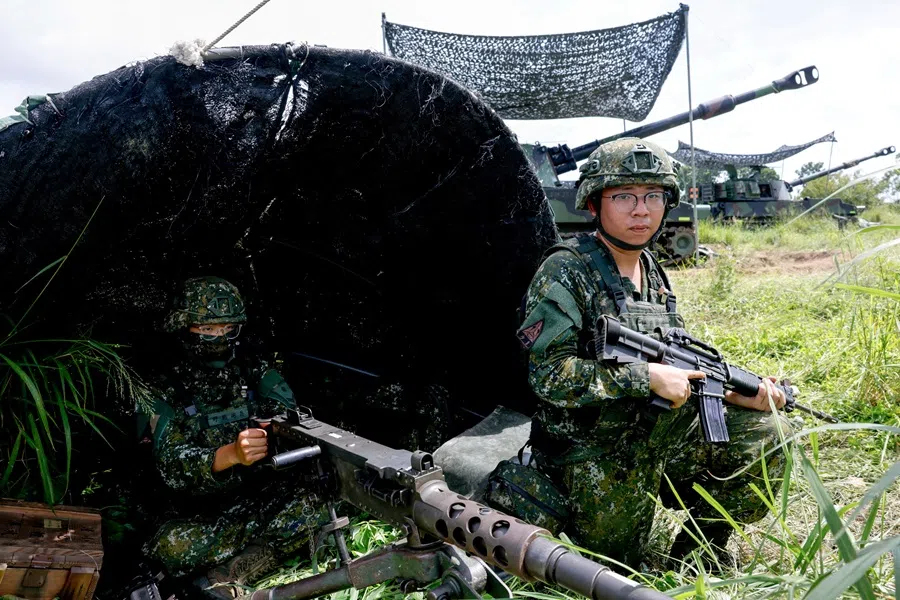
Unlike previous US observation teams that focused on command-level training, the AIT this time sent personnel to observe troops’ on-the-ground operations and reserve forces’ execution. Analysts suggest the US has specific ideas and requirements for Taiwan’s reserve force deployment and adjustment.
Chieh Chung, a researcher at Taiwan’s Association of Strategic Foresight, said that this reveals the US military’s main forces would not advance prematurely near the first island chain in the event of war. Therefore, Taiwan would need to withstand enemy attacks independently for a significant period before the US military could affect the conflict’s outcome.
Taiwanese more willing to fight with US’s support
Since US President Donald Trump returned to office in January this year, his ambiguous stance on the Taiwan issue has led to a significant decline in Taiwanese public confidence in the US and its security commitments. A survey released by the Brookings Institution on 25 April showed that the percentage of Taiwanese who viewed the US positively dropped from 44.9% in July last year to 27.8%.
However, after the US deployed troops in the Israel-Iran conflict in June, CNN obtained a leaked recording in which Trump, during a fundraising event last year, claimed that he had warned Chinese President Xi Jinping that if China sent troops to Taiwan, the US would retaliate by launching airstrikes on Beijing.
The release of this recording has once again sparked discussion over the extent of future US involvement in a potential Taiwan Strait conflict.
... research consistently showed that when the Taiwanese public believes the US would defend Taiwan, their willingness to engage in self-defence rises by 10% to 20%. — Yao-Yuan Yeh, Chair of International Studies, University of St Thomas
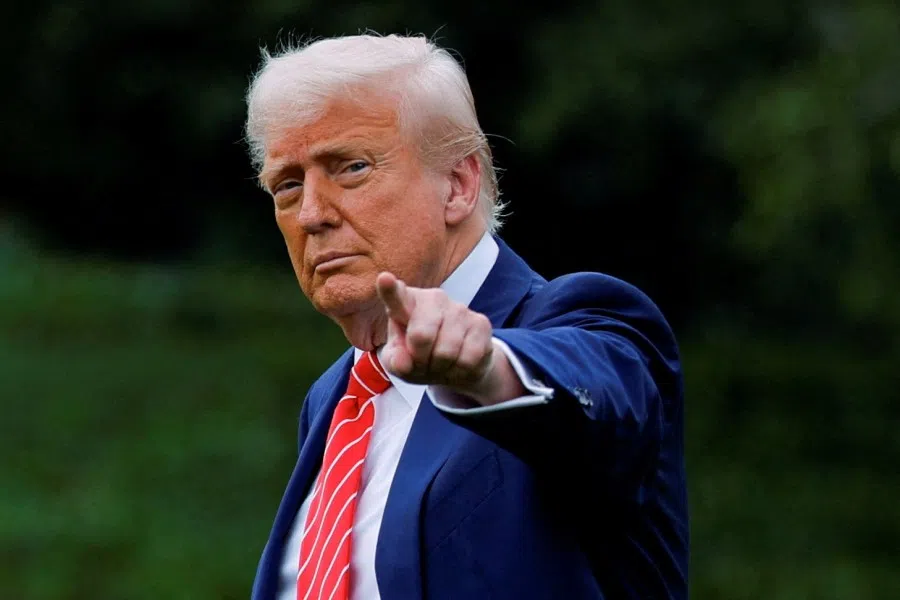
US-based Taiwan academic Yao-Yuan Yeh, chair of International Studies at the University of St Thomas in Houston, has long focused on US-Taiwan relations and American policy towards Taiwan. He told Lianhe Zaobao that his research consistently showed that when the Taiwanese public believes the US would defend Taiwan, their willingness to engage in self-defence rises by 10% to 20%.
Yeh said frankly that at this stage, it is unlikely the US will move away from its framework of “strategic ambiguity” when it comes to Taiwan. “But at the very least, making Taiwanese people feel that the US is likely to protect them does make them more willing to defend themselves.”
US less likely to intervene if Taiwan provokes a confrontation
At the Taiwan Strait Defense tabletop exercise held in early June in Taipei — attended by retired senior military officials from the US, Japan and Taiwan — the head of the US team, former commander of the US Pacific Command Dennis Blair, emphasised that under the Taiwan Relations Act, the US may use military force if Taiwan is subjected to coercion, intimidation or outright military aggression. However, unlike NATO or the US-Japan security treaty, this does not constitute an explicit guarantee of US military intervention in support of Taiwan.
He noted that in the event of a Taiwan Strait conflict, the US decision on whether to deploy forces would hinge on two key factors.
First, successive US presidents have made it very clear that they do not support Taiwanese independence, nor do they endorse any provocative actions. Therefore, if Taiwan were to initiate provocation and Beijing responded, the US would be less likely to get involved. Conversely, if mainland China were to launch an unprovoked attack on Taiwan, the US would be significantly more likely to intervene.
As for the second factor, Blair stressed that it depends on Taiwan itself. He said whether Taiwan has sufficient defence capability and willpower will greatly influence whether the US intervenes in the event of a real conflict.
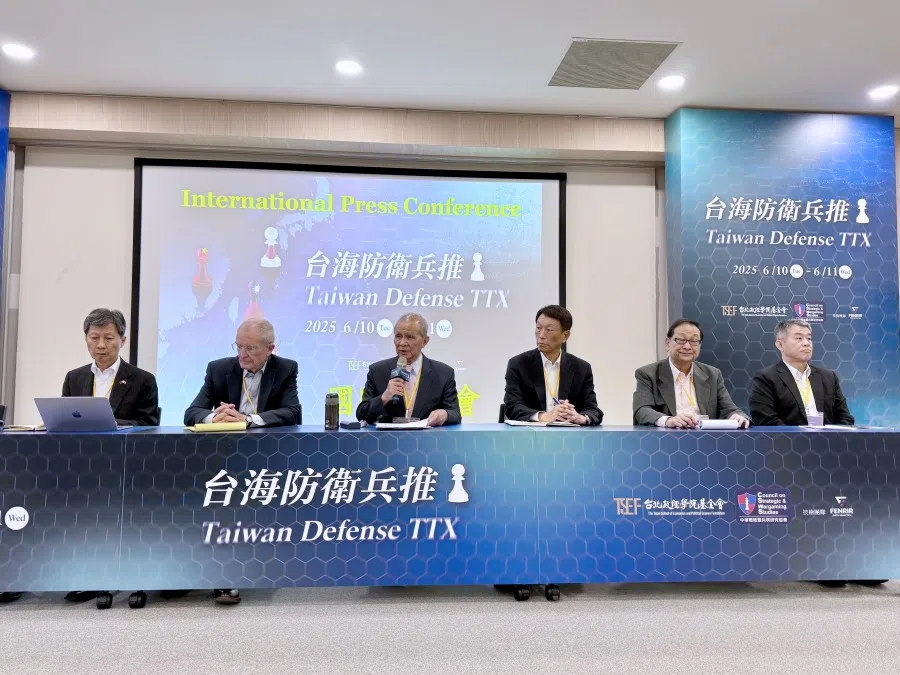
He said, “I’ve been coming to Taiwan for the past 20 years, participating in Taiwanese exercises. From my observations, Taiwan’s ability to defend itself, to defend against Chinese aggression, and its willingness to do so has certainly been increasing. And that would mean that the US would be much more likely to come to the assistance of Taiwan under this matter of great concern.”
Taiwan’s will important factor
As to how Taiwan’s will to defend itself could impact the US’s commitment to its defence, University of St Thomas’s Yeh explained that US policy towards Taiwan involves two levels of consideration. From the perspective of bureaucratic institutions such as the State Department, the Department of Defense and the White House, the US does not believe that Taiwan should place the entire burden of its military defence on the US. Instead, Taiwan must first demonstrate a willingness to defend itself, so that Washington can see its determination to protect its own sovereignty.
Yeh said that if Taiwan demonstrates a willingness to confront the People’s Liberation Army head-on, then at least on an emotional level, the US would be more inclined to intervene.
However, he also acknowledged that whether and when the US military intervenes would ultimately depend on the authority and judgement of the US president. He said, “When such a situation arises, whether the US will do anything depends on the conflict situation and the president’s decision at that time.”
Yeh emphasised that the core of US policy towards Taiwan is actually about avoiding the moment when the president must face that decision. Therefore, strengthening deterrence is what the US most wants Taiwan to achieve. Whether in terms of policy or concrete actions, the US hopes Taiwan will continue to build its deterrent capabilities, such as by increasing the defence budget, advancing arms procurement, and extending mandatory military service. He said, “To a certain extent, all of this is what the US expects from Taiwan.”
This article was first published in Lianhe Zaobao as “抵抗意志达七成 选择维持现状不挑衅 台民仍愿为保台而战”.





